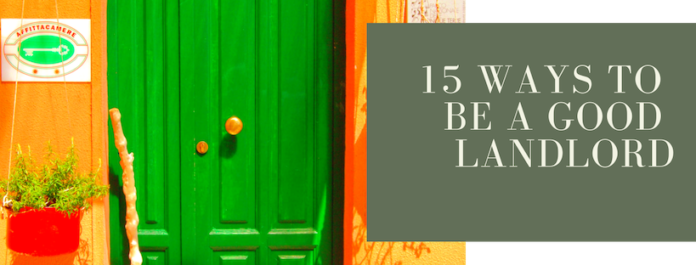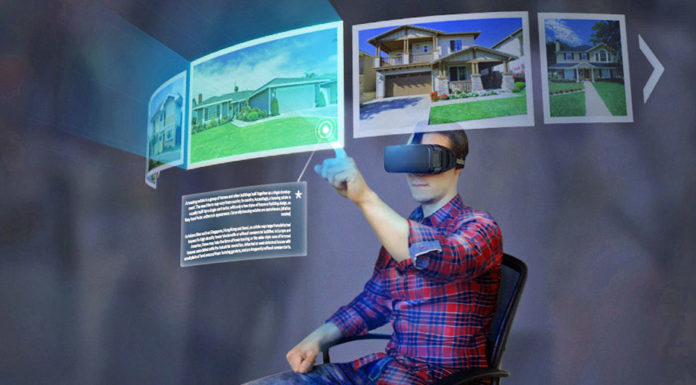Almost 37 percent of Americans rent the home they live in. That’s an estimated 43.3 million household heads! Being a landlord can be a rewarding experience with lots of opportunity, but it can also be challenging too. You have to buy a property that someone is interested in renting, find the right person to live there, and then enter a binding lease agreement with that party.
Finding the right tenant is never a certainty, but there are things you can do to make yourself a landlord that stands out to your tenant and earn their respect.
Read on to learn 15 ways to be a good landlord and wow your tenants!
1. Write a Welcome Letter
One way to get started off on the right foot as a good landlord is to write a welcome letter to your tenant. Your letter should welcome them to the property and give your tenant contact information including your mailing address, email address, and phone number. You can also add important information like:
- How to pay rent
- How to set up utilities
- Reminder that renters insurance is required
- Where to pick up keys
- Details about move-in day
- How to report maintenance issues
- Where to throw away trash and what day trash is collected
- Laundry room and storage collection information
- Parking information
- Neighborhood guidance
- Condition of the property
- Contact info
The welcome letter will be a nice touch because it will likely be unexpected and makes your client feel more at ease with moving into a new home.
2. Help Your Tenant
Do you have a tenant who is new to the area or living in a different neighborhood Adjusting to a new place can be stressful and intimidating. You can help your tenant by giving them a list of nearby places to shop, eat, or hang out. For example, you could choose some of your favorite places and include them in your welcome letter. Have a favorite meal at one of the local hot spots? Give your tenant a couple recommendations so that they feel more comfortable in their new surroundings!
3. Clean Your Property
The most successful landlords take pride in their rental property. One way you show your tenant you have pride in the property they are renting is by ensuring it is clean upon their arrival. After all, the last thing a new tenant wants is to move into a new home or townhouse that will take hours to clean. By making sure your property is clean when they receive the keys, it helps to make the move-in process a smoother one. It also helps you to set a positive tone from the beginning of the lease agreement with your tenant.
4. Be Respectful
Being a good landlord also means being respectful to your tenant and his or her guests. You should be firm about the lease agreement but also be willing to make small concessions if they do not interfere too much with the lease agreement itself.
For example, if your tenant gives you the required notice that they are moving out of the rental property, you may need to show it to another potential tenant. While your lease agreement may give you wide latitude to access the property for showing it, don’t abuse this privilege by scheduling showings too frequently or at odd hours just because the lease says you can. By being respectful to your tenants helps you keep a good reputation as landlord now and in the future.
5. Communicate Effectively
A good landlord communicates effectively with their tenant from the beginning of the relationship. This begins from the first time that the tenant inquiries with you about renting your property. You should respond quickly because this shows them that you care. You should also address their concerns and communicate with them in a meaningful way.
For example, if you know that your tenant is easier to reach through email, do not call them instead. Besides being a tenant’s potential preferred way of communication, sending emails also helps you keep a paper trail of your actions.
6. Be Reasonable
Being a reasonable landlord can benefit you in many of the same ways that being a reasonable person outside of the relationship does. Your tenant will have more respect for you if you are reasonable with them about the lease and your expectations. You will also increase the likelihood that your tenant will want to pay their rent on time and meet their obligations under the lease because you are a reasonable person to deal with.
7. Repair Issues Quickly
To ensure your tenant has a positive experience renting your property, you should be very diligent in repairing the issues they bring to your attention. Besides being something that is likely covered and required in your lease, repairing problems that pop up from time to time will help you keep your tenant happy.
One good rule of thumb is to put yourself in your tenant’s shoes during these situations. Would you want to go for an extended period without air conditioning? Likely not. Keep that in mind as you go about addressing your tenant’s concerns and make necessary repairs.
8. Help Your Tenant
At the root of the lease agreement is a business relationship between you as the landlord and your tenant. You may be leasing your property to earn additional income or pay down your existing mortgage. But don’t let the “business” nature of the lease let you lose sight of the human aspect of this too. You should help your tenant by being a good person to them and being friendly within reason. Being firm about the lease, but also being nice about it will help you to resolve issues or prevent small problems from becoming bigger ones.
9. Follow The Lease
The lease agreement is your roadmap for how to handle the business and legal sides of the landlord-tenant relationship. You should look to your lease agreement when questions arise about what to do in a certain situation or who is held responsible for repair issues. Since your lease is such an important document, you should ensure that it is well-written, legally enforceable and that it defines its terms clearly. This will help you and your tenant to better understand each side’s obligation during the term of the lease agreement.
10. Offer Online Services
In today’s digital age, offering online services can be a great way to manage paperwork and handle unexpected issues in an efficient way.
In short, you can make it more convenient for you and your tenant to communicate to each other. For example, you should consider setting up an online portal for your tenant(s) to submit requests for repairs or other needs. This can help you streamline maintenance issues and delegate them to the necessary repairman so that they are resolved faster.
11. Keep Accurate Records
You should keep accurate records in a safe place so that they are available when needed by your and/or at the request of your tenant.
One thing to consider is keeping your records in electronic format. This is beneficial because by not having a physical copy, you do not have to store them in your home or office. Electronic documents also allow you to send them to your tenant upon request.
You will also be able to organize your records in a more meaningful way so that they are easier to read through if necessary.
12. Stay Consistent
Being a good landlord means staying consistent with how you treat your landlord and their concerns about the property. By being consistent from month to month, this helps give your landlord more confidence about what to expect when they need you. It’s important to not treat one issue as being far more important than another. Every potential issue should be taken seriously and investigated to resolution. When you take potential issues seriously, you send a strong message to your landlord that they matter.
13. Be Honest
It’s important to be honest with your tenant about your expectations and performance of their obligations under the lease. Being honest helps you earn the faith and trust of your tenant which can go a long way in helping to extend the lease term later. If they are happy and know they can trust you, they will weigh this against the price of rent for your property when making their decision whether to renew their lease at the end of its term.
14. Don’t Raise Rent Too High
The decision to raise the rent from lease-term to term is something you should think about before you do it. This means taking an honest look at your costs to rent your property versus what your tenant is paying now. If you have found a good tenant already, one that is respectful to you and your property, makes timely rent payments, and more – you should be careful raising the rent too high. If you do, you put yourself at risk of driving off a good tenant and having to find a replacement. This can take a lot of time and money to interview candidates and vet them out to be sure they are the person you want to live at the property.
15. Dress Professionally
Depending on the rental agreement for your property, you may or may not ever meet your tenant in person. But if are going to meet your tenant in person, you should dress in a professional manner. This sends a message to your tenant that you care about your appearance and take pride in your rental property.
Wrapping Up: How To Be a Good Landlord
There are many different ways how to be a good landlord to your tenant(s). But to be the best landlord you can be, you should adopt only the tips above that complement your unique style. This helps you to be yourself more to your tenant and earn their respect during the term of the lease.














